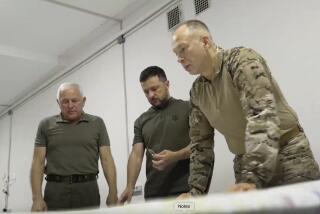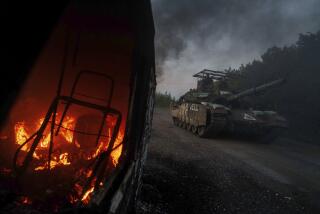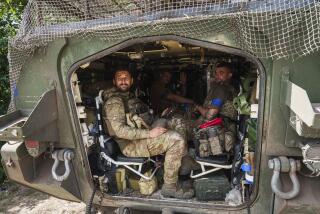Russia cites economic fallout from Crimea annexation
- Share via
MOSCOW — Russia’s economy has been hit hard by the turmoil in neighboring Ukraine, Kremlin officials said Wednesday, as pro-Russia separatists battled to take over more territory in Ukraine’s east — and potentially add to Moscow’s economic burden.
Russia’s annexation of Ukraine’s Crimea region last month and the instability it created in Russian financial markets were cited by government officials for record capital flight and sharply downgraded growth forecasts for the country. Finance Minister Anton Siluanov said that instead of projected 2.5% growth this year, Russia’s economy might show no growth at all.
Russia’s economic slide has accelerated since a rebellion in Ukraine ousted President Viktor Yanukovich, a Kremlin ally, in late February. Russian President Vladimir Putin then sent troops to Crimea, claiming that the ethnic Russian majority there was in danger from the opposition politicians who took power in Kiev, the Ukrainian capital.
U.S. and European sanctions to punish Russia for occupying and annexing Crimea have so far targeted only a few dozen officials and businessmen. But the prospect of broader penalties, such as a Western boycott of Russian oil and gas, have scared investors into cashing out their ruble-denominated assets for hard currency and taking their money abroad.
Russia’s foreign exchange reserves were drained of a record $63 billion in the first quarter of the year, Economic Development Minister Alexei Ulyukayev said Wednesday in an address to the lower house of the parliament.
If that pace continues, losses this year would surpass the $120 billion Russia lost in 2008 at the height of the global recession.
Russian stocks fell 10% last month, wiping out further billions in capital. The ruble has lost 9% of its value since the start of the year, boosting prices for the imported food and manufactured goods on which the Russian consumer market is heavily dependent.
“The acute international situation of the past two months” was the cause, Ulyukayev said, referring to the Ukraine unrest.
Top diplomats from Russia, Ukraine, the United States and the European Union will meet Thursday in Geneva in an effort to resolve the crisis. But with 40,000 Russian troops poised on Ukraine’s border and Ukrainian soldiers battling to recover key government facilities, senior Obama administration officials said they were not expecting a breakthrough.
The officials, who spoke on condition of anonymity, said more sanctions were being considered. The next round would probably target so-called oligarchs and their business interests, which have profited under Putin. Officials believe inflicting pain on this relatively small class of influential Russians is the best way to pressure Putin to change course.
On Wednesday, efforts by the interim leaders in Kiev, the Ukrainian capital, to recover government facilities occupied by Russian paramilitary forces and pro-Kremlin local gunmen faltered. The Russian gunmen seized a column of six armored vehicles from Ukrainian soldiers and narrowly missed grabbing three others.
Ukrainian news reports said 30 armed separatists had captured another building, the municipal headquarters, in Donetsk, the main city of eastern Ukraine. Unconfirmed Russian news reports said about 300 Ukrainian soldiers deployed in the area had laid down their arms.
The Ukrainian government’s bid to push back the Russian incursion was “already a disaster, bordering on a complete fiasco,” said Dmitry Tymchuk, head of the Kiev-based Center for Military and Political Research.
The Ukrainian Defense Ministry confirmed that six armored vehicles had been lost in the town of Kramatorsk after the convoy was blocked by residents. The column was already flying the Russian flag when it later rolled into nearby Slovyansk to a jubilant reception, a witness said.
“A majority of people in Slovyansk are happy that our region may soon join Russia,” Anna Adam, a 37-year-old instructor at an orphanage for the mentally handicapped, said in a telephone interview. “They want Putin to come and help them, give them bigger salaries and pensions.”
Russian Prime Minister Dmitry Medvedev visited Crimea last month and announced that the Kremlin planned to spend at least $7 billion on salaries and raises for government workers and retirees now on Russia’s payroll. The promised investment also is intended to improve infrastructure on the isolated peninsula, including a bridge to connect it with Russian territory across the Black Sea to the east, and new power plants to supply electricity previously provided from the Ukrainian mainland.
Siluanov, the Russian finance minister, warned Cabinet members this week against unbridled spending in Crimea. He said Medvedev’s announcement was made “without analyzing the real needs” of the region, signaling possible disagreement in the Kremlin about how much more economic burden Russia should take on if it expands into impoverished eastern Ukraine.
Russia’s economy has also been dragged down by its heavy investment in Ukrainian industries that are idle or in decline because of the turmoil. The Ukrainian currency, the hryvnia, also has tumbled.
In Brussels, the United States and its NATO allies agreed to step up air patrols over the Baltic nations and deploy additional warships in response to Russia’s military buildup near Ukraine.
The North Atlantic Treaty Organization will also send military personnel to conduct training and exercises in Eastern Europe, officials said.
“We have seen a Russian force that ... imposed its will on a sovereign nation and now has annexed a portion of that sovereign nation,” U.S. Air Force Gen. Philip Breedlove, NATO’s top commander, told reporters after the alliance meeting. “We need to now take measures to assure our allies of our complete commitment” to their defense.
Loiko reported from Moscow and Williams from Los Angeles. Times staff writer David S. Cloud in Washington and special correspondent Victoria Butenko in Kiev contributed to this report.
More to Read
Sign up for Essential California
The most important California stories and recommendations in your inbox every morning.
You may occasionally receive promotional content from the Los Angeles Times.











